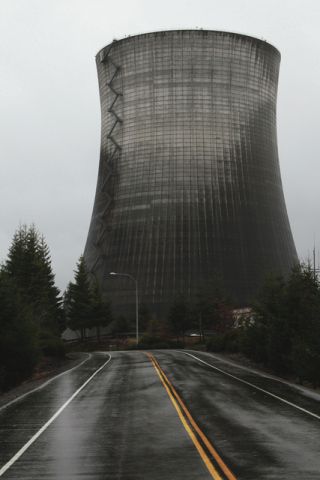OLYMPIA — Thirty years ago, construction was halted on the massive cooling towers on Fuller Hill at Satsop with hopes of a nuclear power future vanishing in the biggest financial boondoggle in state history, coining the phrase “WHOOPS” for the Washington Public Power Supply System.
Now, the newly named Energy Northwest is pushing legislators for a study to see if it makes sense to create new nuclear power facilities across the state.
The state Senate recently approved a bill that would create a task force to study nuclear power as a replacement for fossil fuels passed with a 34-15 vote. State Sen, Brian Hatfield, D-Raymond, voted for the legislation, while state Sen. Jim Hargrove, D-Hoquiam, voted against it. The legislation moved to the House Technology and Economic Development Committee on Feb. 20 for a public hearing and was slated for committee approval on Wednesday, Feb. 26.
Sen. Doug Ericksen, R-Ferndale, says nuclear power is safer and more efficient than in the past, and deserves a fresh look as a source for electricity.
“Nuclear power will have a future in Washington state,” he said during the Feb. 12 floor debate.
Ericksen, the primary sponsor, said Senate Bill 5991 calls only for a study, not construction of new facilities.
The task force would consist of eight legislators, four from the Senate and four from the House, with equal representation from both Democrats and Republicans. They would hold four meetings during 2014, and report their findings to the Legislature by Dec. 1. The task force would be concluded by Dec. 15.
Dale Atkinson of Energy Northwest, which owns Columbia Generating Station, a nuclear power plant near Richland that produces approximately 10 percent of Washington’s electricity, is in favor of the bill.
Atkinson said nuclear power could be a good source of electricity for Washington and the nation because it doesn’t burn fossil fuels and it doesn’t release carbon emissions into the atmosphere.
“We believe that the study of nuclear power as a replacement for fossil fuel is appropriate and timely,” Atkinson said at a public hearing in the Senate Energy, Environment and Telecommunications Committee in January.
Energy Northwest has been pushing for a statewide effort to build five to eight small-scale nuclear power plants since 2009, once even approaching the Grays Harbor PUD to join the effort. PUD commissioners rejected the offer, although they did conduct a public hearing on the matter.
In the 1950s, the Washington Public Power Supply System (WPPSS), since renamed Energy Northwest, started a massive statewide nuclear power-plant construction project. Construction was halted mid-project as a result of design issues and cost changes. Four of the five plants were never finished, leaving the two cooling towers at Satsop as a relic of the past, serving more as an indiciator to where the Satsop Business Park is more than anything else. The fifth plant was the Columbia Generating Station, which is still in operation. WPPSS Board of Directors stopped construction in 1982 because the projected cost for all the plants was going to be more than $24 billion instead of the original $16 billion estimate.
This caused the agency to default on $2.25 billion in bonds — money that had already been spent on the scrapped power plants. At the time, it was the largest municipal debt default in U.S. history. The total debt for the project is currently $5.4 billion, which includes the Columbia Generating Station, according to Energy Northwest. The debt is owned by Bonneville PowerAdministration because they were the original backers on the bonds.
That debt is still being paid by ratepayers through their electricity bills.
Sen. John McCoy, D-Tulalip, is in “soft support” of the bill and said in an interview that before any more reactors are built, nuclear energy advocates will have the task of convincing the public that this will be good for the state.
“The proponents of it have a huge [public relations] campaign to do,” McCoy said. “They are going to have a lot of difficulties.” He also said that supporters will encounter the issue of finding investors to fund future projects.
https://thevidette.com/sections/news/local/could-nuclear-future-be-table-washington-state.html?m









